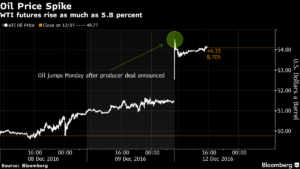Market Report – 12 December 2016
There’s a growing number of central banks questioning the point of printing paper money.
The Danish central bank are now looking into producing a virtual currency instead, which they predict will make crime harder and oversight easier. The Danes aren’t alone. Britain and Sweden are blazing a trail in Europe. Singapore and Canada have already tested blockchain-based currency systems for Internet payments.
According to Bloomberg, “blockchain technology, or a variety of that, for example” would be an obvious model to use for virtual currency.
GBP
Sterling slipped against the dollar on Friday and was on track for its first week of falls in four, with investors’ hopes for a delayed Brexit dampened after British lawmakers said they would stick to Prime Minister Theresa May’s timetable.
The currency rose briefly last week after data showed Britain’s trade deficit narrowed more than expected in October.
BNP Paribas currency strategist Clara Leonard said that while lawmakers’ backing of May’s timetable was a negative for sterling in the short-term, it would not weigh on the currency over the longer run.
EUR
The European Union will sound out Japan this week about the prospect of a breakthrough in their free-trade talks, seeking to counter President-elect Donald Trump’s protectionist tilt and show that the bloc’s market-opening clout is alive and well.
The ECB left their main benchmark rate unchanged last week. Mario Draghi announced that the ECB will extend its asset purchase programme by nine months to the end of 2017. The ECB President went on to say that the bond buying programme will be cut by €20bn a month.
Trading in shares of the world’s oldest bank, Monte dei Paschi di Siena, was temporarily suspended by the Italian stock exchange after the price fell 11% following a news agency report that the European Central Bank had refused it a lifeline.
USD
With the Federal Reserve expected to hike interest rates this week, further information can be found here.
A stronger dollar, lower inflation and a more dovish U.S. Federal Reserve may lead the central bank to increase interest rates twice in 2017, JP Morgan said in a report.
President-elect Donald Trump and his economic stimulus policies could be the catalyst for the first hike of 25 points in June and another one in December. However, the more protectionist approach expected from Trump could hinder the U.S. economy.
JP Morgan has forecast growth of 1.9 percent in 2017 and 1.8 percent in 2018, but such figures do not include the potential impact that ending trade deals might have on the U.S. economy.
Rest of the World
The Renminbi hit an eight year low against the Dollar late last month and is on track for its worst one-year fall ever. Investors are offloading Renminbi assets and moving funds offshore.
Oil jumped to the highest since July 2015 after Saudi Arabia signalled it’s ready to cut output more than earlier agreed while non-OPEC countries including Russia pledged to pump less next year, strengthening the coordinated commitment by the world’s largest producers to tighten supply.
Oil in New York has gained about 20 percent since the Organization of Petroleum Exporting Countries announced last month it will cut output for the first time in eight years.
